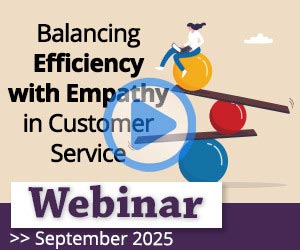Nichola Ansbro explains the four key qualities she looks for in every interviewee before offering them a job.
I tried to delegate recruitment. However, I now sit in on all the interviews for my team. This is because, basic intelligence aside, I am looking for a series of innate qualities that I know make for a great customer service representative.
I can train anyone on a product but I can’t train them to have good manners. After all, if they can’t do something simple like make eye contact when we’re face to face, how will they communicate when they can’t see the person they’re talking to?
Here are the four key qualities I need to see in every interviewee:
1. Emotional intelligence
We don’t write scripts. This is because we want to ensure that every conversation with a customer is completely natural. It’s important to us that they know they’re talking to a real human. Someone who understands and wants to listen.
To make this work, we need a team of accomplished communicators who are aware of what they’re saying and in return realise what the customer is hearing.
Therefore, I am looking for candidates with soft skills, who listen, have empathy and who are articulate. It’s also crucial that they like talking to people.
2. A natural problem solver
Call resolution is incredibly important. In fact, our most important target in the contact centre is to resolve every customer’s issue in one call, regardless of how long it takes.
This requires team members with the mental agility to think fast on their feet. We need people who want to take the time to get to the bottom of the problem and who have the patience to work with (sometimes frustrated) customers, to find a resolution they’re happy with.
3. An ability to stay calm

Nichola Ansbro
Every so often, we get a call from an angry customer. This can be emotionally demanding, and it takes a strong person to stay calm in the face of someone’s wrath. Call handlers need to be able to take a breath and give customers the time to say what they want to say.
Then, be cool and collective enough to win them back on side. It takes someone with perspective and an ability to keep calm under pressure to help someone who, two minutes ago, was calling them every name under the sun.
4. A competitive spirit
Great banter keeps office morale high and those that are naturally competitive help create a lovely sense of spirit in my team. After all, eight hours on the phone is very demanding.
Currently my team are combining their love of figures with friendly rivalry and battling over who takes the most calls.
With thanks to Nichola Ansbro, Contact Centre Manager at Office Kitten
Author: Megan Jones
Published On: 23rd Sep 2015 - Last modified: 18th Aug 2025
Read more about - Call Centre Management, Career, Editor's Picks, Management Strategies, Recruitment and HR, Soft Skills, Team Management


















Excellent article, couldn’t agree with it more. I find some resistance however at times with the “competitive spirit”. Some people don’t enjoy this approach to their duties, and it is hard to find alternative ways to motivate them. Personally, I found that just constant thanks for the work carried out goes a long way, and they then aim to receive this time and time again.
Great article, do you have any tips on interview questions/techniques to determine if candidates have these skills?
Great article with a misleading title.
Skills can be learned and thus by definition can be trained. For example we all have emotional intelligence, but the amount varies in each of us. EI skills can be developed and improved through training and coaching.
I agree that hiring people with already high levels of qualities and skills is the most important task for any manager. Let’s take these already high performers and help them develop to even higher levels.